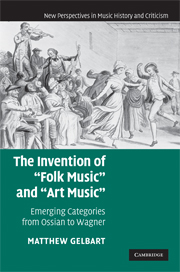Book contents
- Frontmatter
- Contents
- List of music examples
- Acknowledgements
- Introduction
- 1 Function to origin: national identity and national genius emerge, c. 1700–1780
- 2 From pastoral to picturesque: nature, art, and genre in the later eighteenth century
- 3 Genius versus art in the creative process: “national” and “cultivated” music as categories, 1760–1800
- 4 The invention of folk modality, 1775–1840
- 5 “Folk” and “tradition”: authenticity as musical idiom from the late eighteenth century onward
- 6 Organic “art music” and individual original genius: aestheticizing the folk collective
- 7 Local nation and universal folk: the legacy of geography in musical categories
- 8 Folk and art musics in the modern Western world
- Index
7 - Local nation and universal folk: the legacy of geography in musical categories
Published online by Cambridge University Press: 22 September 2009
- Frontmatter
- Contents
- List of music examples
- Acknowledgements
- Introduction
- 1 Function to origin: national identity and national genius emerge, c. 1700–1780
- 2 From pastoral to picturesque: nature, art, and genre in the later eighteenth century
- 3 Genius versus art in the creative process: “national” and “cultivated” music as categories, 1760–1800
- 4 The invention of folk modality, 1775–1840
- 5 “Folk” and “tradition”: authenticity as musical idiom from the late eighteenth century onward
- 6 Organic “art music” and individual original genius: aestheticizing the folk collective
- 7 Local nation and universal folk: the legacy of geography in musical categories
- 8 Folk and art musics in the modern Western world
- Index
Summary
The concepts of folk music and art music as interdependent, origin-based musical domains quickly exploded out of the more localized discourses and milieus in which they formed. The new categories would eventually reach the Americas and parts of Asia and Africa, but already by the 1820s they had come to underlie musical thought across Europe. Their spread is clear when we contrast the roles assigned to a simple, symbolic song in each of two wildly successful French operas, separated by a crucial forty years. In André-Ernest-Modeste Grétry's 1784 Richard Cœur-de-lion, the plot pivots on a “romance” played by King Richard's friend Blondel in disguise as a blind minstrel – and which turns out to be a composition by King Richard himself. (The imprisoned king is alerted to Blondel's proximity by the tune, and knows he will be rescued.) This chivalric romance may be “old” and “simple,” but like the “picturesque” contents of Percy's Reliques it belongs to the ancient aristocratic minstrels and kings – the Rizzios and the James Is. (Indeed, Richard is very much an old-regime opera; its signature tune “Ô Richard, ô mon roi” became a royalist anthem during the Revolution.) The drama in François Adrien Boieldieu's La Dame blanche, which took the Opéra-Comique by storm in the mid-1820s, also hinges on the protagonist's recognition of a song, but the song now represents the new “folk” category.
- Type
- Chapter
- Information
- The Invention of 'Folk Music' and 'Art Music'Emerging Categories from Ossian to Wagner, pp. 225 - 255Publisher: Cambridge University PressPrint publication year: 2007



